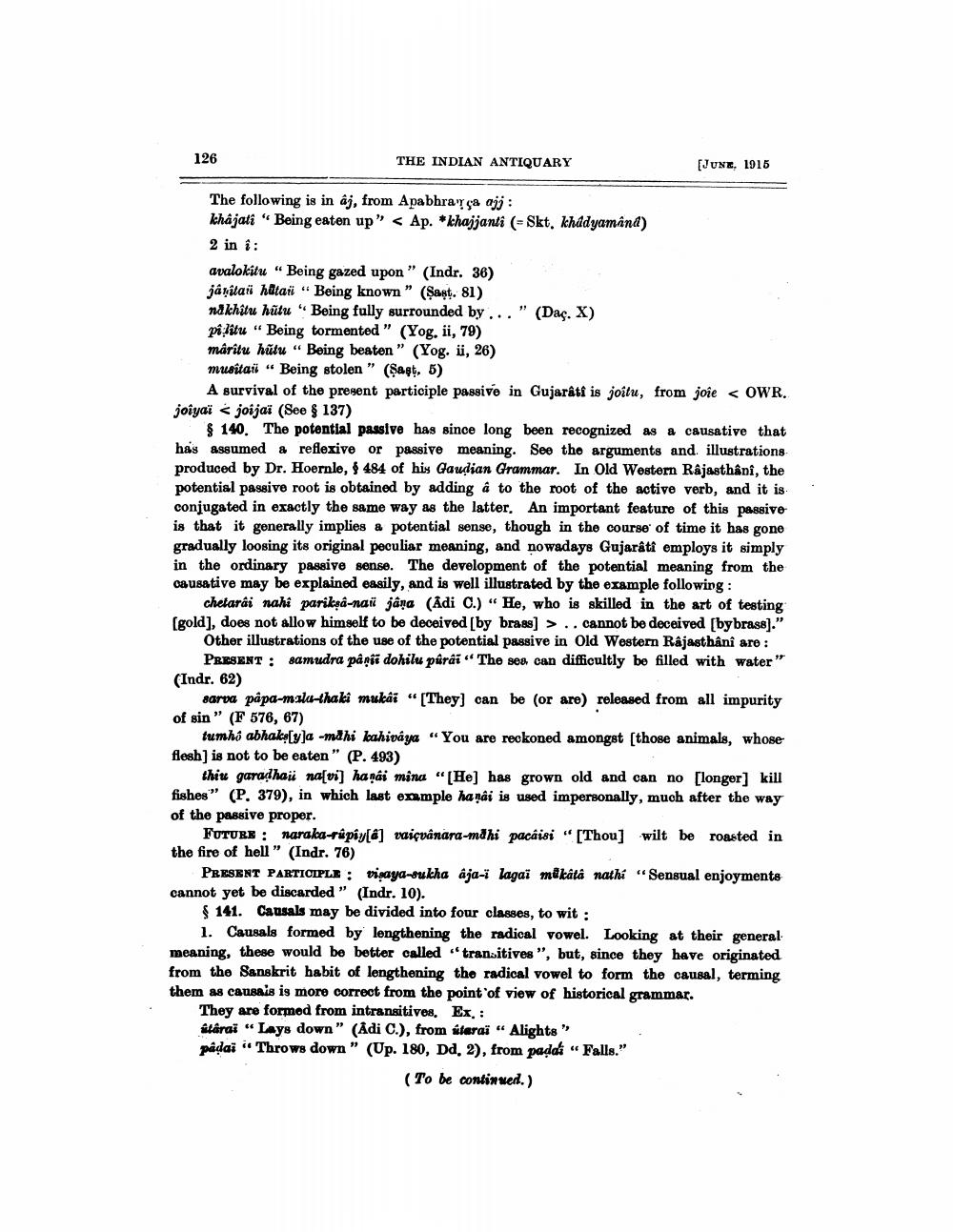________________
126
THE INDIAN ANTIQUARY
[JUNE, 1915
The following is in aj, from Apabhra'yça ajj : khájati "Being eaten up" < Ap. *khajjanti (=Skt, khádyamând) 2 in i: avalokitu "Being gazed upon" (Indr. 36) jánitaji hitaü " Being known " (Sart. 81) nakhitu hūtu "Being fully surrounded by..." (Dac. X) pilitu "Being tormented" (Yog. ii, 79) maritu hūtu "Being beaten" (Yog, ü, 26) musitaii " Being stolen " ($a$t. 5)
A survival of the present participle passive in Gujarati is joitu, from joie < OWR. joiyai < joijač (See § 137)
$140. The potential passive has since long been recognized as a causative that has assumed a reflexive or passive meaning. See the arguments and illustrationsproduced by Dr. Hoernle, 484 of his Gaudian Grammar. In Old Wostern Rajasthani, the potential passive root is obtained by adding a to the root of the active verb, and it is conjugated in exactly the same way as the latter. An important feature of this passive is that it generally implies a potential sense, though in the course of time it has gone gradually loosing its original peculiar meaning, and nowadays Gujarati employs it simply in the ordinary passive sense. The development of the potential meaning from the causative may be explained easily, and is well illustrated by the example following:
chetarai nahi pariksa-nai jana (Adi C.) "He, who is skilled in the art of testing (gold), does not allow himself to be deceived [by brags) > .. cannot be deceived [by brass]."
Other illustrations of the use of the potential passive in Old Western Rajasthânî are :
PRESENT : samudra påşti dohilu púrái "The ses can difficultly be filled with water" (Indr. 62)
sarva papa-malu-thaka mukai "[They) can be (or are) released from all impurity of sin " (F 576, 67)
tumhi abhaks[y]a -mihi lahivaya “You are reckoned amongst [those animals, whose flesh) is not to be eaten" (P. 493)
thir garadhaii na[vi] hanái mina "(He) has grown old and can no [longer] kill fishes" (P. 379), in which last example hanai is used impersonally, much after the way of the passive proper.
FUTURE : naraka-túpiy[a] vaiçvanara-mähi pacáisi "[Thou] wilt be roasted in the fire of hell" (Indr. 76)
PRESENT PARTICIPLE: vijaya-sukha aja-i lagai mlkáta nathi "Sensual enjoyments cannot yet be discarded ” (Indr. 10).
$141. Causals may be divided into four classes, to wit :
1. Causals formed by lengthening the radical vowel. Looking at their general meaning, these would be better called transitives", but, since they have originated from the Sanskrit habit of lengthening the radical vowel to form the causal, terming them as caurais is more correct from the point of view of historical grammar.
They are formed from intransitives. Ex.: stárai“Lays down" (Adi C.), from úlaraï " Alights padai Throws down" (Up. 180, Dd. 2), from padat “Falls."
(To be continued.)




